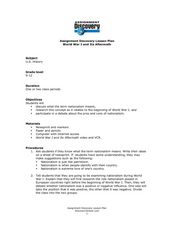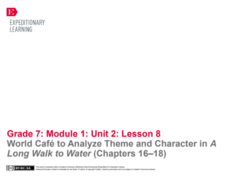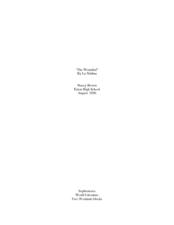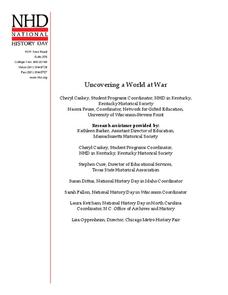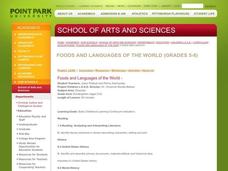Breaking News English
The World Is 0.28% More Peaceful Than a Year Ago
Some days, the world seems like it is becoming darker, but research suggests that the world might actually be becoming a more peaceful place. An informational reading passage accompanied by a series of activities builds English language...
Film English
World Builder
If you could build your own world from the ground up, what would you include? Ask your pupils this question, and have them write about their worlds and share with partners. Then, show the short film, which includes some impressive world...
Curated OER
World War I and Its Aftermath
Students examine World War I and its consequences. In this World War I lesson, students watch the Discovery video "World War I and Its Aftermath." Students then research how nationalism contributed to the spread of the war...
EngageNY
World Café to Analyze Theme and Character in A Long Walk to Water (Chapters 16–18)
Here comes a surprise ending! Readers discuss their thoughts about the ending of A Long Walk to Water by answering probing questions. They participate in a World Café where they work in triads to complete a chart and a prompt during...
Houghton Mifflin Harcourt
Nature Walk: English Language Development Lessons (Theme 2)
Walking in nature is the theme of a unit designed to support English language development lessons. Scholars look, write, speak, and move to explore topics such as camping, woodland animals, instruments, bodies of water, things found at a...
Indiana University
World Literature: "One Evening in the Rainy Season" Shi Zhecun
Did you know that modern Chinese literature “grew from the psychoanalytical theory of Sigmund Freud”? Designed for a world literature class, seniors are introduced to “One Evening in the Rainy Season,” Shi Zhecun’s stream of...
National History Day
Challenging the Status Quo: Women in the World War I Military
Why are some so resistant to change? The status quo is often to blame for a lack of forward movement in society. Following the events of World War I, women in America suddenly had a voice—and were going to use it. Scholars use the second...
EngageNY
World Cafe: Analyzing Sojourner Truth’s “Ain’t I a Woman?”
May I take your order? Scholars read "Ain't I a Woman" and participate in a World Cafe. They work in small groups to discuss text-related questions and then complete a Note-Catcher sheet to organize their thoughts. For homework, learners...
EngageNY
Analyzing the Resolution of the Play: World Café Discussion
It's time to get active! Scholars participate in a World Café protocol to promote discussion and leadership. They leave their seats and move from group to group to discuss critical questions related to their read-aloud of Shakespeare's A...
EngageNY
World Cafe: Analyzing the Jim Crow Laws
The Plessy v. Ferguson Supreme Court case connected to the Jim Crow laws. Scholars explore the topic using the World Café protocol to analyze specific Jim Crow laws. They discuss how the laws relate to Plessy v. Ferguson and their...
Curated OER
World Literature: “The Wounded” By Lu Xinhua
“The Wounded,” the title story from a collection of stories about the Chinese Cultural Revolution (1977-78), is the central text in a World Literature unit examining choices. An anticipation guide, discussion topics, vocabulary list,...
Houghton Mifflin Harcourt
A World of Animals: English Language Development Lessons (Theme 10)
Animals are the theme of this series of English language development lessons. Scholars take part in grand conversations about woodland, jungle, and grassland animals. They also go on picture walks, read poems and high frequency words,...
Curated OER
Reasons for Settling the New World
After studying the reasons settlers entered the New World, primary learners try to persuade others to enter this new land. Class members present their arguments in a variety of ways including posters, writings, and charts. Richly...
National History Day
Why Did the United States Enter World War I in 1917?
World War I was the first major conflict on a global scale. Using primary documents, learners determine why the United States chose to enter World War I when it did. After analytical writing and group research, the causes of America's...
City University of New York
Women's Suffrage and World War I
Democracy cannot exist where not everyone has equal rights. Discuss the state of democracy and women's suffrage during World War I with class discussions, debates, and primary source analysis, in order for class members to connect with...
EngageNY
Introducing the Struggle for Survival in the Introduction of World without Fish
No fish? Catch a word. Scholars read World without Fish and record unfamiliar vocabulary in their word catchers. They discuss word meanings as well as root words. They answer text-dependent questions before discussing the importance of...
EngageNY
Introducing World without Fish
One fish, two fish, red fish, no fish. Scholars analyze World without Fish to determine the gist, identify vocabulary, and answer text-dependent questions. As learners read, they use sticky notes to annotate the text. They also work in...
Houghton Mifflin Harcourt
Home Sweet Home: English Language Development Lessons (Theme 5)
Through grand discussion, picture cards, and poems, enhance language proficiency with a Home Sweet Home themed unit created to support English language development. Each lesson follows a listen, speak, move, and/or look routine that...
PBS
Symbolism and the Use of “New Language” in The Handmaid’s Tale
Words matter. Words frame thought. Words are symbolic. Readers of Margaret Atwood's The Handmaid's Tale examine how the words In Gilead's "New Language" reinforce the power of the government and provided insight into the symbolic level...
National History Day
Propaganda Posters of World War I: Analyzing the Methods Behind the Images
The power of a picture. During the events surrounding World War I, propaganda posters were widely distributed in American society to sway the emotions of its citizens. By analyzing World War I propaganda posters in the first installment...
The New York Times
Evaluating Sources in a ‘Post-Truth’ World: Ideas for Teaching and Learning about Fake News
The framers of the United States Constitution felt a free press was so essential to a democracy that they granted the press the protection it needed to hold the powerful to account in the First Amendment. Today, digital natives need to...
National History Day
Uncovering a World at War
Has media always had an influence on public policy? After researching and reading news articles written during World War I, learners understand the influence of communication and media. They discuss articles in small groups and as a...
Curated OER
Foods and Languages of the World
Students study world cultures with an emphasis on languages and cultures. In this world cultures lesson, students study the countries of Spain, China, Italy, and the United States. Students read the story Everybody Cooks Rice and move...
EngageNY
Analyzing Language, Character, and Theme: World Café Discussion
As part of their study of A Midsummer Night's Dream, class members meet in a drama circle to discuss and role-play scenes from the play. They then engage in an activity called World Cafe, analyzing the characters' actions from the text....
Other popular searches
- World Languages Spanish
- World Languages Food
- Languages of the World
- Lesson Plans World Languages
- World Languages \ Food
- World Languages \\ Food
- World Languages + Food
- World Languages, French




